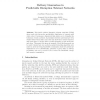Free Online Productivity Tools
i2Speak
i2Symbol
i2OCR
iTex2Img
iWeb2Print
iWeb2Shot
i2Type
iPdf2Split
iPdf2Merge
i2Bopomofo
i2Arabic
i2Style
i2Image
i2PDF
iLatex2Rtf
Sci2ools
NETWORKING
2007
2007
Delivery Guarantees in Predictable Disruption Tolerant Networks
This article studies disruption tolerant networks (DTNs) where each node knows the probabilistic distribution of contacts with other nodes. It proposes a framework that allows one to formalize the behaviour of such a network. It generalizes extreme cases that have been studied before where either (a) nodes only know their contact frequency with each other or (b) they have a perfect knowledge of who meets who and when. This paper then gives an example of how this framework can be used; it shows how one can find a packet forwarding algorithm optimized to meet the delay/bandwidth consumption trade-off: packets are duplicated so as to (statistically) guarantee a given delay or delivery probability, but not too much so as to reduce the bandwidth, energy, and memory consumption.
Computer Networks | Delay/bandwidth Consumption Trade-off | Disruption Tolerant Networks | NETWORKING 2007 | Packet Forwarding Algorithm |
| Added | 30 Oct 2010 |
| Updated | 30 Oct 2010 |
| Type | Conference |
| Year | 2007 |
| Where | NETWORKING |
| Authors | Jean-Marc François, Guy Leduc |
Comments (0)

